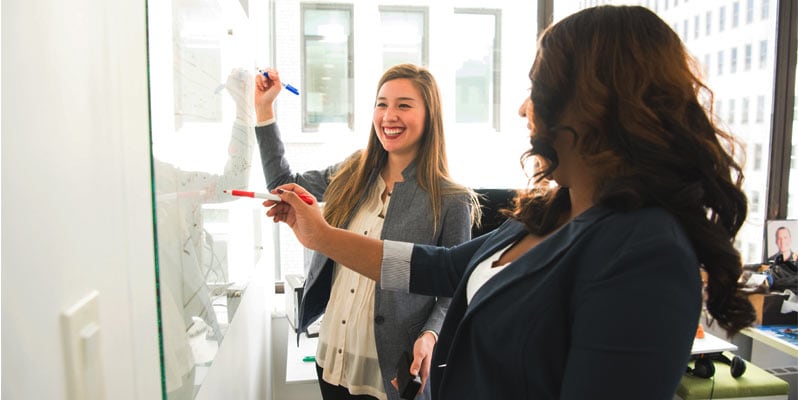
No two workplaces are the same, but they all have something in common – people. Whether you’re working for a large multinational, a boutique independent, a school, a hospital, or even freelancing, you must establish, maintain and grow relationships with colleagues, stakeholders, clients and managers. This makes working with people one of the most integral soft skills – something that becomes even more critical when you’re working remotely or in a hybrid environment.
Of course, there’s a reason it’s a skill. We don’t always get on with everyone, we may have difficulties getting our point across, understanding what the other person wants, communicating clearly and setting expectations. But skills can be learned. This blog post is all about how to improve your workplace relationships.
Collaborating and communicating effectively
Collaboration and communication are constants in work and life, both of which begin with you. You can influence other people (we’ll get to that later), but you cannot change them. The easiest way to improve workplace relationships is to begin with the person you have the most control over – yourself. Consider the following:
- Do you willingly collaborate with others or are you more inclined to micro-manage?
- What formats do you feel you communicate best in – in-person, email, Slack or messaging platforms, Zoom calls, or over the phone?
- Are you comfortable chatting with colleagues and clients or do you find it nerve-wracking or frustrating?
- What is your preferred mix of collaboration and asynchronous work?
- Do you feel that people understand what you mean when you express yourself?
These questions can help you define where you are as a communicator and in which areas you can improve. It’s worth remembering that collaboration isn’t just a matter of ‘two minds are better than one’. The sense of inclusiveness that others feel when asked to help solve a problem is in itself an indication of trust. If you feel trusted, you’re more likely to go the extra mile to help achieve a good result.
Therefore, you should devote at least some time every day to building your work relationships – and don’t be afraid to step away from your computer to do so. We are all relational, so getting to know someone at work without an ulterior motive goes a long way to building good relationships between people and departments. Chat with co-workers in the kitchen, grab a coffee with someone, or invite them to join you for lunch one day. You can also walk over to their desk for a quick hello.
But what if you’re working online? Consider sending a quick message to check in with a co-worker. Ask how they’re doing and what they got up to over the weekend. Start a weekly games hour with your team with a focus on relationship-building (we recommend GeoGuessr, Jackbox Games, and Codenames over Zoom). And if you’re looking to make daily meetings or standups more interesting, throw in a random question at the start or end of the meeting. It’s a great way to get to know the people you work with! You can also stay in touch with folks over LinkedIn and congratulate them on their successes as they arise. Finally, responding promptly to emails doesn’t necessarily build relationships, but it is good manners and demonstrates your dependability.
Communicating clearly becomes easier the more you practice. But here are some good rules of thumb:
- Speak and write plainly so that people can understand you. You can use Grammarly and (sometimes) ChatGPT to help with your emails and messages.
- Be polite – as the old adage goes ‘manners cost nothing’.
- Practice active listening. Focus on what the other person is saying (rather than thinking about what you want to say) before you reply.
- If you don’t understand what someone means, ask them. It can help to mirror back to someone. For example, ‘What I hear you saying is that you can’t complete your portion of the project because Sam from Sales is blocking you. Have I got that right?’
- Difficult as it is, always assume best intent. If someone appears to be difficult or inefficient, consider first whether there is a failure of communication rather than writing the person off as a rude idiot.
- When someone helps you out or does a great job, thank them. In work, it can be easy to focus on what went wrong rather than what went right. You can make a big difference when you reinforce a person’s self-worth and value to the workplace by letting them know that you appreciate their efforts or that they did something well.
What's your Management Trajectory?
Are you wondering how far away you are from your next promotion? Take our quiz to assess your management career pathway.
GO TO QUIZ
How to set expectations and improve relationships
Fostering positive relationships begins by setting an example of the type of workplace relationships you want. That begins with honesty. People can sense when you’re being genuine (or inauthentic) and will respect you more for it. That means that, if you know or doubt you can achieve the requirement in the proposed timeframe during a project debriefing or task request, be honest. Counteroffer with a deadline you can deliver or let them know what you need – money, resources, time, manpower, priority shifts – to meet the deadline.
If it’s something outside the scope of your capabilities, be honest about that too. Let them know that you have limited exposure to this kind of project but would be happy to give it a go or recommend someone you know could do it well. If your situation changes and you can no longer meet your deadline, let people know as soon as possible rather than waiting for the due date to roll around unmet. People may be put off in the moment but they’ll quickly get over it and appreciate your forthrightness in the long run.
We’ll quickly clarify here that honesty is not an excuse for rudeness or tactlessness. You don’t have to launch into a flowery soliloquy of flattery, but you don’t need to be blunt either. Respect goes a long way. You can be honest and polite at the same time.
Here are some other ideas for improving relationships:
- Enthusiasm is infectious! Don’t be afraid to show your passion and be a cheerleader for your team.
- Stay away from office politics if you can. It’s better to give someone a compliment behind their back than a barbed comment.
- At the beginning of a project or brief, make sure you fully understand what’s being asked and clarify any uncertainties.
- Ensure that you give feedback – as long as it’s helpful. The truth can be difficult but gilding the lily or downplaying serious issues erodes trust over time. Also, look out for ways to encourage others in what they’re doing.
- Get out and about among your team. There’s simply no substitute for face-to-face communication, even if your face-to-face is Zoom or Teams.
- Strive to be inclusive and fair. Nothing undermines confidence in the workplace quicker than favouritism, real or perceived.
How to work with different personalities
Each one of us is unique with different perspectives and values. It’s one of the things that makes the world so interesting, and sometimes, frustrating. Learning to work with people who are different from you is a great starting place for learning how to improve workplace relationships.
There are many popular kinds of personality tests and types you can subscribe to – Myer-Briggs, DISC, Big Five, Four Temperments – but the Enneagram is the one we’ll talk to. It’s been used widely in professional settings and has a good balance of simplicity and complexity. You may wish to take a test to see which type you belong to and read up on that before reading about the other types.
In particular, it can be helpful to pay special attention to each type’s deepest fear and core motivations. Consider how these fears and motivations can manifest in the workplace and the people you work with. If you can understand where someone is coming from, it can help you to empathise with them and find a solution that will suit everyone involved.
For example, let’s say you have a colleague who you have some friction with. After reading about the Enneagram, you believe they are a Type 1 or Perfectionist. You learn that they fear being incorrect, so they put a lot of pressure on themselves (and others) to be perfect and do the most morally good. This gives you an ‘aha’ moment into why they prioritise meticulousness over deadlines. You can now understand where they are coming from and help them shift the metric of success from perfect to on time.
Your Career in Leadership and Management
Do you want to learn more about leadership and management skills you need to be a good leader, emerging job roles and salaries, and recent industry insights?
Discover your career in leadership and management.
LEADERSHIP AND MANAGEMENT CAREER PAGE
How to work with difficult people
You’ve applied all the advice so far and you’re still having difficulty with a particular person. You can’t seem to get through to them no matter what you try. It’s maddening! What do you do?
Good relationships help prevent stressful situations and create a productive workplace. But that’s lovely, unhelpful nonsense if you can’t seem to have a cordial relationship with someone at work, let alone a good relationship. At this point, you may want to consult someone with more expertise in dealing with people. Seek out managers, leaders or effective communicators in your workplace. Book a meeting or a chat over coffee in their calendar. Ask them for their advice on the situation and to help mentor you on how to relate better to this person.
If you can’t think of any suitable people at work, think about your social circle. Do you know anyone who could give you some helpful pointers on improving this specific relationship? If the answer is still no, consider professional training.
There are some fantastic short professional courses available. You may even be able to access LinkedIn Learning for free through your local library. There are also accredited courses that can help you, for instance, a Certificate IV in Leadership & Management (BSB40520). Your company may even cover the cost of your training.
How to get along with colleagues and clients
Ultimately, these are the building blocks that encourage collaboration between colleagues and promote a sense of comradery. Close friendships in the workplace increase productivity and workplace satisfaction, highlighting the value of social connections in all areas of life. Fostering friendship at work also makes you more resilient in times of stress. A business-related diploma can impart effective tools if you want to promote and nurture these types of workplace relationships.
There are many benefits to building strong workplace relationships. Remember, that you are entitled to enjoy where you work and benefit from the sense of community that a connected workplace provides.
How To Ask Your Boss For Time Off For Study






